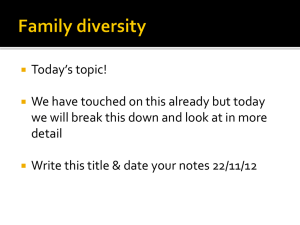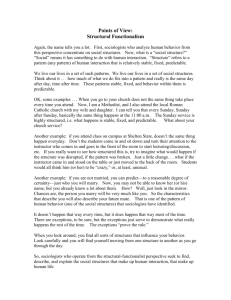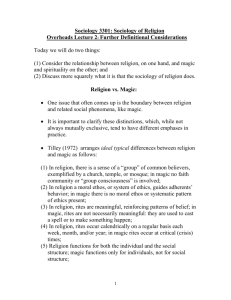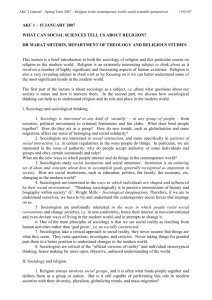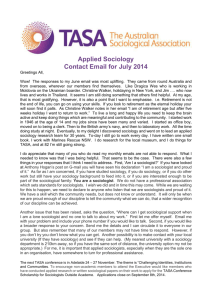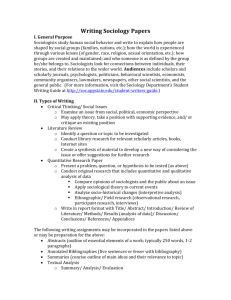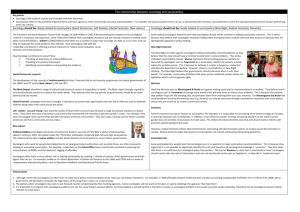Sociology 3301: Sociology of Religion
advertisement
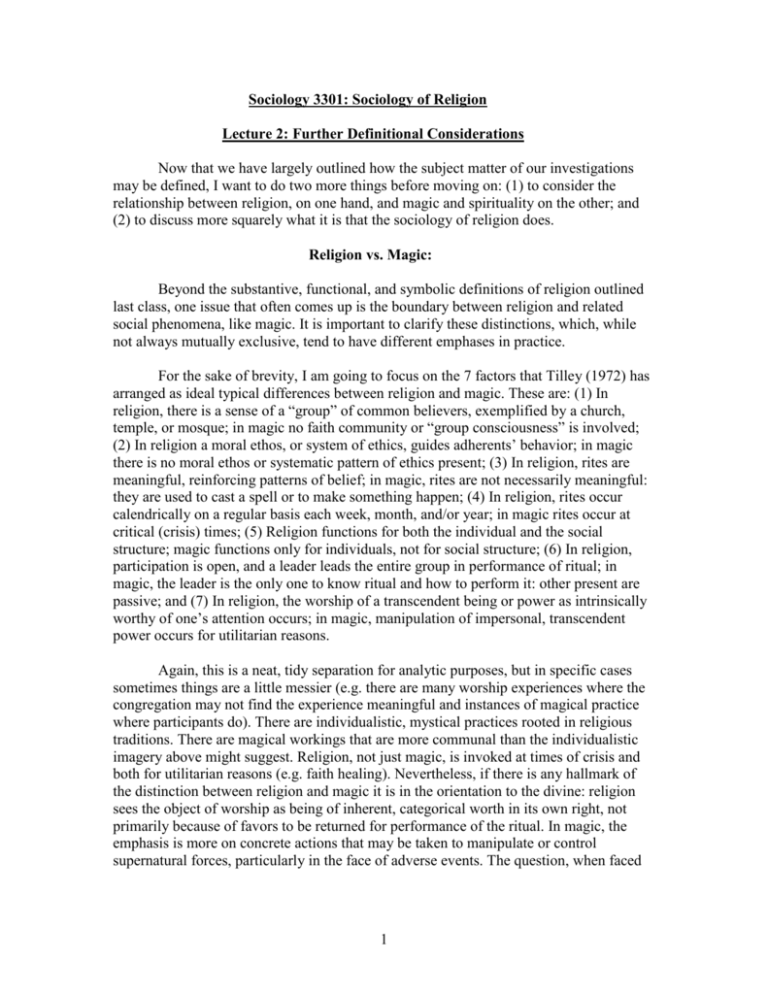
Sociology 3301: Sociology of Religion Lecture 2: Further Definitional Considerations Now that we have largely outlined how the subject matter of our investigations may be defined, I want to do two more things before moving on: (1) to consider the relationship between religion, on one hand, and magic and spirituality on the other; and (2) to discuss more squarely what it is that the sociology of religion does. Religion vs. Magic: Beyond the substantive, functional, and symbolic definitions of religion outlined last class, one issue that often comes up is the boundary between religion and related social phenomena, like magic. It is important to clarify these distinctions, which, while not always mutually exclusive, tend to have different emphases in practice. For the sake of brevity, I am going to focus on the 7 factors that Tilley (1972) has arranged as ideal typical differences between religion and magic. These are: (1) In religion, there is a sense of a “group” of common believers, exemplified by a church, temple, or mosque; in magic no faith community or “group consciousness” is involved; (2) In religion a moral ethos, or system of ethics, guides adherents’ behavior; in magic there is no moral ethos or systematic pattern of ethics present; (3) In religion, rites are meaningful, reinforcing patterns of belief; in magic, rites are not necessarily meaningful: they are used to cast a spell or to make something happen; (4) In religion, rites occur calendrically on a regular basis each week, month, and/or year; in magic rites occur at critical (crisis) times; (5) Religion functions for both the individual and the social structure; magic functions only for individuals, not for social structure; (6) In religion, participation is open, and a leader leads the entire group in performance of ritual; in magic, the leader is the only one to know ritual and how to perform it: other present are passive; and (7) In religion, the worship of a transcendent being or power as intrinsically worthy of one’s attention occurs; in magic, manipulation of impersonal, transcendent power occurs for utilitarian reasons. Again, this is a neat, tidy separation for analytic purposes, but in specific cases sometimes things are a little messier (e.g. there are many worship experiences where the congregation may not find the experience meaningful and instances of magical practice where participants do). There are individualistic, mystical practices rooted in religious traditions. There are magical workings that are more communal than the individualistic imagery above might suggest. Religion, not just magic, is invoked at times of crisis and both for utilitarian reasons (e.g. faith healing). Nevertheless, if there is any hallmark of the distinction between religion and magic it is in the orientation to the divine: religion sees the object of worship as being of inherent, categorical worth in its own right, not primarily because of favors to be returned for performance of the ritual. In magic, the emphasis is more on concrete actions that may be taken to manipulate or control supernatural forces, particularly in the face of adverse events. The question, when faced 1 with a concrete example, is to start with such considerations to help sort out which side of the line the phenomena in question fits. Some have argued that as science and technology grow in a given society, magic declines. Yes, it is true that the amount of magic in a society tends to be inversely correlated to the amount of science and technology – as the latter enables people to have more control over their environments. That doesn’t mean that it is dead, however (I know people right here in town deeply interested in renaissance magic and alchemy, I am involved in an esoteric study group involving faculty, grad students, and others, and the study of magic and esotericism is growing in academia, witnessed by a conference I attended last August). Yet, even though countervailing trends like these remain small in relation to magic, one must be careful not to suggest the same for religion - as it does different things than simply manipulate the environment: it provides meaning and moral guidance in ways that science cannot. Spiritual But Not Religious? Another issue that arises today is whether private systems of belief can be called religion. Many individuals have patterns of belief that solve issues of ultimate meaning for them but these are not necessarily shared with others. While many sociologists argue that religion is by definition a social phenomenon, today it is common to hear “I’m spiritual, not religious” (with the implicit suggestion that religion is a stifling, dogmatic thing, but spirituality more “soulful,” more directly related to the divine). But what is spirituality? Wuthnow (1998) argues that spirituality consists of all the beliefs and activities by which people attempt to relate their lives to the divine or some other conception of a transcendent reality. Nothing in this is necessarily antithetical to religion, and spirituality has been historically connected to religion. Even though it is a social phenomenon, individual forms of piety such as prayer, meditation, or other devotions (often with a mystical component) have long been associated with major religious traditions (e.g. Sufism in Islam, Kabbalah in Judaism, Benedictine, Franciscan, and Dominican practices in Catholic Christianity). Thus, given these examples, perhaps what we are talking about today is more what Hamberg (2009) called “unchurched spirituality – religious beliefs and practices that exist outside of traditional religious institutions. But “unchurched” does not mean not social. Spirituality is not just the creation of individuals, but is shaped by larger social circumstances as well as the beliefs and values present in the wider culture. We construct our spirituality out of the social toolbox of cultural resources available around us – and many of these are actually rooted in the major religious traditions. Hence, individual spirituality is never far removed from religion. This is borne out in the U.S. where, while organized religion remains relatively strong compared to other Western countries, surveys show a lot of overlap. In a study of baby boomers by Wade Clark Roof (1999), 60% of respondents claimed to be both 2 spiritual and religious while only 15% claimed to be spiritual but not religious. More recently, Newsweek and the Beliefnet website polled a random sample of Americans and got similar results. A majority of older Americans, including baby boomers, continued to see themselves as both religious and spiritual, but this fell to 48% among respondents under 40. Indeed, 30% of those younger respondents claimed to be spiritual but not religious. Yet, generational changes notwithstanding, these results show the difficulty of trying to separate religion and spirituality. Indeed, while I suspect that the results in Canada would show even more respondents claiming to be spiritual, not religious, again it is hard to separate these things in practice, because the apple doesn’t fall far from the tree. The two boundary issues I have addressed above again bring us back to the importance of definitions when we are dealing with religion. Beyond the substantive, functional, and symbolic definitions, as well as the messy distinctions outlined today, we must be aware that how we define a phenomena has a great deal to do with how we study it. Thus, throughout the course it will be important to reflect on: (1) your own assumptions regarding the definition of religion; (2) the defining criteria used by social scientists; and (3) the working definition of religion that we outlined last class. What Do Sociologists of Religion Do? In the second half of today’s lecture, I move away from definition of the subject matter to concentrate more on what, exactly, it is that sociologists of religion do. I outline this by considering 10 points: 1. Sociologists study social groups: Religions are, if nothing else, social groups. Whether established congregations, study groups, or a group of pagans who gather in the woods at summer solstice, religious bodies are social collectivities. Whether investigating the dynamics of group affiliation or the formation of religious movements, sociologists of religion must direct their research efforts at the social groups involved. 2. Sociologists study social interaction: While religion may entail interaction with the divine, it certainly involves social interaction among humans. Circumcisions, pilgrimages, christenings, bar mitzvahs, confessions, peyote ceremonies, church picnics – religion is dripping with social interaction. Ever since Durkheim’s (1915) The Elementary Forms of the Religious Life, where he posited that social interaction was actually the source, the very cause of religion, sociologists have paid careful attention to the rich and dramatic varieties of social interaction that compose religious phenomena. 3. Sociologists study social institutions and social structures: Religion – by definition – is a social institution. And in many parts of the world, religion is one of the most powerful, all pervasive institutions out there. It thus makes sense that many of the founding sociologists like Emile Durkheim, Max Weber, Georg Simmel, W.E.B. Du Bois, and Friedrich Engels wrote and theorized extensively about religion. Sociologists of religion are interested not only in analyzing religion as a social institution in its own right, but also in understanding how religion influences, and is influenced by, other major 3 social institutions. For example, Max Weber’s seminal study The Protestant Ethic and the Spirit of Capitalism (1904) explores the ways in which specific Protestant/Calvinist religious beliefs played a key, even decisive role in the development of modern western capitalism. 4. Sociologists study social patterns: Do women attend religious services more often than men? Are African-Americans more likely to believe in the existence of Satan than whites? Do Jews tend to vote more liberal than Christians? Do religious people divorce less frequently than the nonreligious? Sociologists of religion have their work cut out for them in exploring the plethora of patterns that emerge concerning religion in society. The most hotly debated topic within the sociology of religion in recent decades has, of course, revolved around the question of whether people are more or less religious today than they were in the past: the secularization debate (which hinges, in part, on how you define religion in the first place). 5. Sociologists understand that an individual can be truly understood only within his or her socio-historical context: To put it simply, an individual can be a member of a particular religion only if that religion exists when he or she does. Furthermore, where a person exists is key. Someone born in Sri Lanka is much more likely to be Buddhist than a person born in Honduras, who will likely be Catholic. A growing number of people on national surveys are putting down “nothing” or “no religion” in terms of religious identity – but they are not “nothing” in a socio-historical vacuum. Today in the West, many people’s parents are also “nothing,” or at least nonpracticing. They don’t raise their kids with any particular religious education or involvement. As well, many today grow up in largely secular enclaves, attending school with few overtly religious kids or teachers. Such individuals live in a time in history and within a culture in which traditional religiosity is not imperative, lack of religion isn’t illegal or suspect, and being “nothing” is considered quite normal. In short, an individual’s personal religious identity (or lack thereof) is greatly influenced by where, when, and among whom that individual lives. 6. Sociologists are interested in the ways in which individuals are shaped and influenced by their social environment: Of the many components of the social environment that are important in shaping and influencing how individuals live their lives, religion is certainly crucial. Religious values, religious norms – in short, religious culture – greatly affect how people understand themselves and others. Sociologists are fascinated by the effects of religion on things like people’s sex lives, political views, national identities, economic activities, eating habits, career choices, marital relations, and, conversely, how such things affect people’s religious identities. 7. Sociologists are fascinated by deviance, nonconformity, and the ways in which people resist or change the social forces that surround them: The most dramatic role that deviance plays in the realm of religion is the development of new religious traditions. After all, every new religion was originally deviant in a given social order. In that context, some individual or group of individuals decided to go against the norm, to rebel against the established order, to defy the authorities, and even the law. 4 Christ, St. Paul, Muhammed, Siddhartha, Guru Nanak, Baha’Allah, Martin Luther, Joseph Smith – all were religious deviants in their day who, rather than passively accept and internalize the religious life around them, broke free and successfully acted against the prevailing religious system to create something new. 8. Sociologists are fascinated by “the social construction of reality” : The sociological perspective opens up the unavoidable possibility that religion may well be a social construction. When studying the world sociologically, one must bracket the question of whether religion is truly something received from Above. Countless sociologists over the past two centuries have had their suspicions that religion is not necessarily an outgrowth, reaction, or response to the divine/supernatural. Instead, they focus on the alternative possibility that it is an outgrowth of human culture – a product of human psychological, sociological, even neurological or physiological processes. Yet considering that religion is a social construction is often unacceptable to the deeply religious, seen as threatening to their very cosmology and sense of reality. Some sociologists, like Randall Collins (1992), take a very hard position on this: “there are two obvious positions that you can take about religion: either you believe it or you don’t. Either you believe it or you don’t: in one case it is a supreme Reality that transcends everything sociology is concerned with; in the other it is an irrational superstition about things that don’t exist.” It is certainly the case that many, if not most, sociologists take the latter position. Yet, there are religious sociologists, as well as religious sociologists of religion. Even Peter Berger, one of the leading sociologists of religion, is a man of faith. Indeed, many sociologists fall somewhere between convinced atheist and faithful believer. That is why Collins’ mutually exclusive dichotomy above may, in fact, be too extreme. Rather than a false either/or dichotomy, it is more fruitful to conceive of a perspective that encompasses a continuum. Collins’ extremes can be at either end, while in the middle there are those who believe that the heart or root of a given religion is of divine origin, while various trappings, layers, or components are socially constructed. Similarly, one can believe that the underlying impulse of religion is mystical, eternal, and otherworldly in nature, but that what becomes of that impulse (how it is directed, channeled, and understood) is largely a social and cultural phenomenon worthy of study in its own right. Of course, the “devout” in each camp will likely find such a middle ground unacceptable, yet the atheistic sociologist and the devoutly religious may not actually be so far apart from one another in their understanding of religion as one might think. After all, the extreme sociologist sees 100% of all religions as social constructions, while the religious fundamentalist sees 99% of religions as social constructions – all religions except his or hers! That is, most deeply religious people can entertain the notion that all other religions are of human origin, just not their own. 9. Sociologists debunk: Debunking within sociology expresses itself in 2 basic directions: (1) debunking “commonsense” views and ideas about religion held throughout the wider society; and (2) debunking various religious truth claims themselves. 5 The first, debunking “commonsense” views and ideas about religion held throughout society, involves using the tools of sociological research to dispel taken for granted truths about religion that aren’t actually true. For example, decades of sociological research has convincingly shown that religious groups do not “brainwash” their adherents. Many people who check out so-called “cults” don’t join them, people who do often leave of their own volition, and people who claim they were brainwashed tend to be ex-believers who need a way to justify/rationalize behavior and beliefs they no longer approve of or subscribe to (Wessinger, 2000). Furthermore, there is no valid, empirical proof of “mind control,” the alleged ability of small religious groups to alter the brain functioning of members. The second aspect of sociological debunking involves critically examining religious truth claims themselves. This can be as mundane as challenging church attendance statistics, showing that they are overinflated – perhaps counting everyone ever baptized as a member despite the fact that many later have little religious involvement. Or, debunking may be as dramatic as revealing that an image of the Virgin Mary that appeared on a window pane could be explained by natural causes. Sociologists simply do not take religious truth claims at face value, for example, questioning the Mormon claim that Native Americans are the descendants of Middle Eastern Jews who sailed from ancient Israel to North America (16,000 miles by boat). They point out that this is highly implausible, and that both DNA analysis and all nonMormon archaeologists, anthropologists, and historians disagree with the claim. To be sure, the job of the sociologist is not to argue these matters with faithful believers, nor to try to de-convert people. Rather, we are curious intellectual investigators, intensely seeking to understand how it is that people can believe that which lacks reasonable evidence. We do not seek to undermine anyone’s faith, to prove anyone’s religion “wrong.” We study religious systems because they and how their adherents construct reality intrigue us. Of course, it often boils down to this thing called faith. Some have it in some respects, others accept other foundational principles for their reality. Ultimately, whether any particular religion is true is a theological, not a sociological question. So long as religions limit their assertions to matters pertaining to things like God, heaven, and the spiritual/otherworldly, sociologists should just stay out of it. But insofar as they talk about people, history, government, society, the here and now, such factual claims about this world should be carefully examined, investigated, and, if they do not square with the facts, challenged (e.g. faith healers who claim that they can cure cancer). That is, any claim asserted as factual concerning what occurs in this world and this reality – be it asserted by a steelworkers’ union, a corporate think tank, a communist party pamphlet, a soccer mom, a senator, a member of the Lesbian and Gay Alliance, a cadre of sociologists, or a religious group – is fair game for sociological inquiry and (as the case may be) sociological debunking. 6 10. Sociology entails a critical approach to understanding the world: Sociologists always take a questioning, skeptical view of all social phenomena – and that applies to our study of religion as well. Hence, for sociologists of religion, nothing is sacred, even when studying a realm of humanity based on the sacred. We do not shy away from tackling difficult issues. We do not aim to expose or sensationalize these things in our studies, but if we do find inconsistencies or improprieties, we certainly would not sweep them under the rug (e.g. Manning’s 1999 study seeking to understand women who join conservative or fundamentalist religious traditions tried to balance both an empathetic understanding of these women’s lives, assertions, and experiences with an ability to critically analyze and expose various contradictions and inconsistencies, specifically in relation to patriarchal gender norms (e.g. despite what their tradition taught them, and their claims that they rejected feminism, most to some extent embraced feminist values and did not “submit” to their husbands in many areas of their lives). This study wasn’t about debunking religion or exposing the inconsistencies or hypocrisy of her subjects, but an attempt to consider how women struggle with gender issues, sometimes successfully, sometimes not, in a religious milieu. Yes, this critical sociological stance when studying religion can be problematic, even more so considering that many sociologists are outsiders to the very phenomenon they seek to understand and explain. (e.g. how could a deaf person study music?) There is a debate over whether a non-religious sociologist, similarly, can really understand religion at all (Stark and Finke, 2000). Yet, being outsiders to the very phenomena we wish to study is what social science is all about. Yes, as outsiders, we simply cannot get at all of the truth, but we can still offer significant and important insights. For example, one need not be an ethnic minority or a committed racist to generate significant insights about racism in society. One need not be a radical environmentalist or a corporate polluter to generate significant insights about environmental issues. Parents are not the only people capable of studying parenting. Doctors are not the only people capable of studying the medical industry. Fascists are not the only people capable of studying fascism. Artists are not the only people capable of studying art. Prostitutes are not the only people capable of studying prostitution. Musicians are not the only people capable of studying music – and so it goes with religion. Yet, being an outsider to religion means that there are just some crucial matters that we may never completely understand. But this rule also applies to the insider: the profoundly religious are also hindered in their understanding of some very important matters that can only be grasped from the outside. Neither the sociological (outsider) perspective nor the religious (insider) perspective on religion has the monopoly on truth. Both have their own particular insights. Both are important and essential. 7
